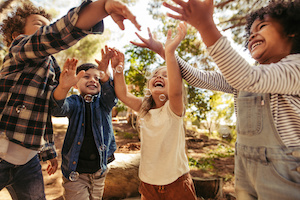
Does Peaceful Parenting Support Kids to Develop Social Emotional Learning (SEL) Skills?
read •

Dr. Laura,
I love your approach. I heard you say on a podcast that peaceful parenting supports kids to develop social emotional learning (sel) skills. I thought it was about parental self-regulation. Can you explain?
Yes! Peaceful Parenting does focuses on parental self-management, but also on connection and coaching (instead of controlling) the child to be their best self. Together, these three big ideas form the foundation of social emotional learning for the child, contributing to the development of social-emotional skills in children in so many ways! For instance:
- Regulate Yourself
- Emotional Regulation: The first big idea emphasizes parents' ability to regulate their own emotions. Modeling emotional regulation is crucial for children to learn how to manage their own feelings. When parents demonstrate calm and thoughtful responses to challenging situations, children are more likely to develop effective emotional regulation skills.
- Empathy: By regulating their emotions, parents create a safe and empathetic environment. Children learn to recognize and understand their own emotions and, in turn, develop empathy for others. This forms the foundation for positive social interactions and relationships.
- Connect:
- Secure Attachment: The second big idea centers around building a strong parent-child connection. A secure attachment is fundamental to social-emotional development. Children with a secure attachment feel safe and supported, leading to increased self-esteem and a willingness to explore and interact with others.
- Effective Communication: Connecting with children facilitates effective communication. Teaching children to express themselves and actively listen to others contributes to their communication skills, a vital component of social interactions.
- Coach, Don't Control:
- Problem-Solving Skills: The third big idea encourages parents to adopt a coaching role rather than a controlling one. This approach promotes problem-solving skills in children. They learn to analyze situations, consider alternatives, and make decisions—a valuable skill set for navigating social challenges.
- Respectful Discipline: Coaching instead of controlling means the parent uses Respectful discipline. Children understand the reasons behind rules and consequences, fostering a sense of responsibility and accountability for their actions. This approach contributes to positive social behavior.
- Conflict Resolution: Children raised with peaceful parenting principles are more likely to develop healthy conflict resolution skills. They learn to navigate disagreements in a constructive manner, contributing to positive relationships.
- Autonomy and Independence: Allowing children to make age-appropriate decisions and learn from their experiences promotes autonomy. This autonomy, coupled with guidance from parents, helps children develop a sense of independence and responsibility, key aspects of social-emotional growth.
In summary, the three big ideas of peaceful parenting—regulate yourself, connect, and coach, don't control—all actively contribute to social-emotional learning in children. They lay the groundwork for emotional regulation, empathy, secure attachment, effective communication, problem-solving skills, respectful discipline, autonomy, and independence. These principles collectively support the holistic development of children's social and emotional well-being!




